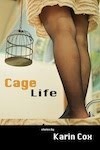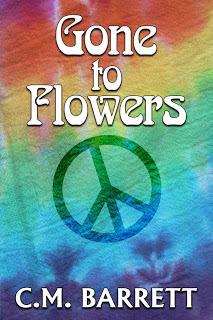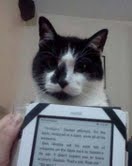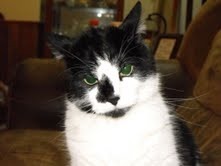C.M. Barrett's Blog, page 9
March 26, 2012
Creativity and the Dreaded "Mommy Guilt"

Connie has written some excellent blog posts in the past about how effective guilt is at stifling creativity; I know this firsthand.
Ever since I became a mother, almost a year ago now (although it doesn't seem like that long ago!), I've been battling the dreaded "Mommy Guilt." It doesn't matter that I took a year off from my high-pressure position as an editor and inhouse author in trade publishing (and recently resigned from it) because I wanted to be a stay-at-home mom, I still often feel guilty about the hours I spend each day on my keyboard, freelancing part-time as a "book doctor" and editor. Most of those hours occur when she is tucked away in bed for the night, slumbering sweetly, but some of them necessitate her going to nursery school two days a week.
However, as my girl grows and increases in independence by the day, I'm beginning to realize that—even if it means late nights and sacrificing some time with my child and a good deal of my social life—my work has benefits for her as well as for me (and for our household in general). For me, my work in the creative arts is not a luxury: it is a necessity. While I devote much of my time to freelance editing, and sometimes begrudge that it doesn't allow me enough time to write, I am one of those lucky individuals who can say, for a fact, that I truly love what I do. It is my passion. I love taking a diamond in the rough and polishing it up to add more facets. I love helping other authors make their work the best it can be.
For my daughter, my passion for my work means that she not only gets to see firsthand the value of having a strong work ethic, but that she will also grow up appreciating that work should be a delight, something you actively look forward to doing. Already, I am seeing the shoots of her own burgeoning creativity as she indulges in her daily play. My love for the written word has also inspired in her a love of books. Even at just one year of age, she loves to carefully turn the pages (now recognising that pages are for turning and not for tearing) and to point to the bright pictures. Spending time reading to my darling is quality time, and although she is too small yet to fully understand the stories I write for her, I hope that one day they will number among her favourites.
When she was very small, my guilt at snatching short, private moments to write was overwhelming—and sometimes paralysing. But as she grows, I'm realizing that she, too, actively values time spent alone in creative play. She doesn't always want an adult playing with her or hovering over her; sometimes she wants to explore objects in solitary (although supervised) reflection.
Interestingly, my book of short stories, "Cage Life," although written some years ago before I became a mother, deals with themes relating to guilt and freedom in motherhood. In it, a young mother longs for the carefree life she once led, which leads to disastrous consequences. Now that I am a mother, it is probably not a story I could bear to write, but I still feel that it explores many of the wistful, private moments that mothers, particularly first-time moms, struggle with: the loss of a singular identity; the guilt; the longing for freedom, either creative or just a few hours to take a long bath or to go to the hairdresser. Don't get me wrong, I love being a mother. My child will always be my greatest work, and a work-in-progress for my entire life. But, as a creative, I also know that I have other children—children stuffed away in drawers and hastily scribbled upon in brief snatches.
My advice to all new mothers who write, and who are struggling to find the time to be creative while keeping up with diaper changing, feeding, playing with and consoling babies, is that we should try not to feel guilty about anything that rounds us out and makes us who we truly are. Our children need us to be ourselves, with all of our passion, creativity and individuality intact. It is how they learn the value of those elements to humanity. And if nothing else, writing provides an escape from the everyday that is empowering and fully imaginative. We may be covered in baby vomit, have been up since 5 am, and really, really need to mop the floor sometime today, but in our heads we can be dancing flamenco, solving murder mysteries, trying to eke out a living on an alien world, or any manner of other exciting possibilities. So guilt be damned! Tonight she is sound asleep and for those silent hours in between the little cries in the night, I'm not a just a mommy, I'm a writing mommy, and write I will!
Karin's book of short stories Cage Life is available from Amazon US http://www.amazon.com/Cage-Life-ebook/dp/B005DC6AHM/ref=sr_1_1?ie=UTF8&qid=1332765096&sr=8-1
Amazon UK http://www.amazon.co.uk/Cage-Life-ebook/dp/B005DC6AHM/ref=sr_1_1?ie=UTF8&qid=1332765161&sr=8-1
Her book of poetry, Growth is available from:
Amazon US http://www.amazon.com/Growth-ebook/dp/B005D5RCD0/ref=ntt_at_ep_dpt_2
Amazon UK Growth
Barnes & Noble http://www.barnesandnoble.com/w/growth-karin-cox/1104361734?ean=2940011380730&itm=2&usri=karin+cox
Follow Karin's blog at www.karincox.wordpress.com
Read more about Karin's work www.editorandauthor.com
Follow Karin on twitter @Authorandeditor
Or Facebook www.facebook.com/KarinCox.Author

Published on March 26, 2012 15:09
March 25, 2012
How to Crush Your Creativity: Feel Guilty
Guilt sometimes involves self-criticism, which was described in an earlier post. However, the kind of self-criticism I described involved tearing your work apart, condemning yourself for even thinking talent lurks somewhere within you, and similar acts of self-sabotage.
Guilt as it relates to creativity, is less related to the actual creative project. It has much more to do with stepping beyond the limitations you may have learned as a child.
Here's an example from my childhood. My father had dreams of becoming a minister. However, he made what he thought was a more practical choice, graduating from college with an engineering degree. Because he made a choice that didn't come from his deepest desires, he went into his work life with an attitude of resentment that deepened into total dislike of his job, a dislike that he never hesitated to share with the family that depended on his income for survival.
Even though his career decision had been made before he got married and had children, in telling us how he'd had to give up his dreams, he made us the cause of his great life's disappointments. Illogical as this was, young children, who rely on their parents for their understanding of the world, are inclined to choose loyalty over logic.
It took me years to figure out how thoroughly I'd been programmed to believe that you weren't supposed to like your job. Whenever I had the opportunity to switch careers and choose one I would enjoy, I managed to talk myself out of doing so.
Finally I uncovered the truth: that I felt guilty about the idea that I could enjoy my work life much more than my father (who had allegedly sacrificed his happiness for his children) ever did. Once I managed to cut the unconscious ties of guilt, it was surprisingly easy to make creative choices and create a career that totally thrilled me.
Solution
Ask yourself if you're afraid of having too much fun in your career/work life and why this is so.
If you can relate this to dissatisfaction on the part of either of your parents in their jobs, explore this connection.
Ask yourself how your dissatisfaction can increase their happiness. You may find reasons: Your success could make them feel like failures. They could feel that you are disloyal to the family.
You can tease out answers by imagining telling your parents how happy you are in your career, how much you enjoy the money you make and the creative opportunities. Imagine their responses. (This works whether they are alive or not.)
Finally, make a choice. You can choose to be loyal to your family or you can take the risk of independence and happiness.
Guilt as it relates to creativity, is less related to the actual creative project. It has much more to do with stepping beyond the limitations you may have learned as a child.
Here's an example from my childhood. My father had dreams of becoming a minister. However, he made what he thought was a more practical choice, graduating from college with an engineering degree. Because he made a choice that didn't come from his deepest desires, he went into his work life with an attitude of resentment that deepened into total dislike of his job, a dislike that he never hesitated to share with the family that depended on his income for survival.
Even though his career decision had been made before he got married and had children, in telling us how he'd had to give up his dreams, he made us the cause of his great life's disappointments. Illogical as this was, young children, who rely on their parents for their understanding of the world, are inclined to choose loyalty over logic.
It took me years to figure out how thoroughly I'd been programmed to believe that you weren't supposed to like your job. Whenever I had the opportunity to switch careers and choose one I would enjoy, I managed to talk myself out of doing so.
Finally I uncovered the truth: that I felt guilty about the idea that I could enjoy my work life much more than my father (who had allegedly sacrificed his happiness for his children) ever did. Once I managed to cut the unconscious ties of guilt, it was surprisingly easy to make creative choices and create a career that totally thrilled me.
Solution
Ask yourself if you're afraid of having too much fun in your career/work life and why this is so.
If you can relate this to dissatisfaction on the part of either of your parents in their jobs, explore this connection.
Ask yourself how your dissatisfaction can increase their happiness. You may find reasons: Your success could make them feel like failures. They could feel that you are disloyal to the family.
You can tease out answers by imagining telling your parents how happy you are in your career, how much you enjoy the money you make and the creative opportunities. Imagine their responses. (This works whether they are alive or not.)
Finally, make a choice. You can choose to be loyal to your family or you can take the risk of independence and happiness.
Published on March 25, 2012 08:59
March 16, 2012
An Irish Blessing

Doolin, a village in County Clare, on the Atlantic coast.
I know a lot of Irish blessings and some curses, too. The one below is a favorite.
May your glass be ever full.
May the roof over your head be always strong.
And may you be in heaven
half an hour before the devil knows you're dead.

View from a cottage I rented in Kilfenora, the Burren, County Clare.
Published on March 16, 2012 15:08
March 12, 2012
How to Crush Your Creativity: Shut Down
I could describe this with other words: apathy, indifference, or resignation. I used the phrase, "shut down" because it's an action that illustrates the above emotions. What you shut down are the sensory, emotional, and caring mechanisms.
No one likes your idea? Who cares?
You just got another rejection for a creative project? So what?
You haven't had an original idea in three months? Big deal.
You're starting to feel dull, slightly rancid, and claustrophobic? It's better than getting hurt or having your hopes raised, only to have them crash once more to the ground.
A brief interval of being shut down probably does no harm. When the heart aches beyond endurance and the nerve endings are beyond frayed, a period of retreat provides a vacation for the overwrought. "Brief," however, is the defining adjective.
Beneath the layer of anesthesia that numbs the pain, your imagination, hopes, and dreams still live. If you continually suppress them, you could end up feeling far unhappier than you did when you were suffering defeat. There's a good reason for this: the only one responsible for this pain is you, and you know it.
Solution
If you've reached the point where you can't conjure up any enthusiasm for either continuing a current project or starting a new one, allow yourself a vacation, but, if you can, skip the Novocaine.
Spend your checking-out time enjoying yourself. Be with friends. Express your creativity by enjoying that of others. Listen to music you love, read, watch movies. Be kind to yourself and look for ways to make yourself happy.
Get back to where you once belonged. Ask yourself why you express your creativity? Is it for the approval of others? Or is it because it gives you pleasure to do so? If you can remember that you do it for the love of it, you're on the road to reliving that feeling. Once the feeling is renewed, the creative spark that gives you life will re-ignite, and its fire will warm you once again.
No one likes your idea? Who cares?
You just got another rejection for a creative project? So what?
You haven't had an original idea in three months? Big deal.
You're starting to feel dull, slightly rancid, and claustrophobic? It's better than getting hurt or having your hopes raised, only to have them crash once more to the ground.
A brief interval of being shut down probably does no harm. When the heart aches beyond endurance and the nerve endings are beyond frayed, a period of retreat provides a vacation for the overwrought. "Brief," however, is the defining adjective.
Beneath the layer of anesthesia that numbs the pain, your imagination, hopes, and dreams still live. If you continually suppress them, you could end up feeling far unhappier than you did when you were suffering defeat. There's a good reason for this: the only one responsible for this pain is you, and you know it.
Solution
If you've reached the point where you can't conjure up any enthusiasm for either continuing a current project or starting a new one, allow yourself a vacation, but, if you can, skip the Novocaine.
Spend your checking-out time enjoying yourself. Be with friends. Express your creativity by enjoying that of others. Listen to music you love, read, watch movies. Be kind to yourself and look for ways to make yourself happy.
Get back to where you once belonged. Ask yourself why you express your creativity? Is it for the approval of others? Or is it because it gives you pleasure to do so? If you can remember that you do it for the love of it, you're on the road to reliving that feeling. Once the feeling is renewed, the creative spark that gives you life will re-ignite, and its fire will warm you once again.
Published on March 12, 2012 08:50
February 23, 2012
How to Crush Your Creativity: Be Self-Critical
To get clear on this, we need to distinguish between "criticize" and "critique" and throw in the word "evaluate."
We need to evaluate the work we're doing. If I'm writing something (as I am now), I want to stop and see if the words make sense and if they will communicate what I mean.
However, even with the supposedly neutral process of evaluation, timing is everything. If I stop to check every word, my creative motion gets stalled. In the beginning stages of a creative process, it's often more effective to let it have its way and evaluate it once the burst of energy has slowed down or stopped.
Evaluation that says, "I think this word/idea would be better than the original" and goes on to make the replacement can enhance the creative process. Criticism is a different species.
Criticism says, "That's the stupidest idea I ever heard. I really have no talent. I should give up before it's too late." Too late, to use an architectural analogy, can mean that if you continue building your idea/project, it's going to crumble. It also means "Quit before someone else finds out how stupid you are and laughs at you or punishes you."
In psychological terms, criticism is the voice of a parent speaking to a child, a voice you've internalized. You learned to summon and hear its voice because you didn't want to get punished, whether that punishment was physical or humiliation. The critical voice punishes you in advance in order to save you from worse.
Solution
Self-criticism is deadly. Sometimes people stumble into the practice of criticizing themselves for being self-critical. Don't.
Here's another solution that won't work: Give up creative expression so that you won't hear the critical voice. That voice is on constant combat mode. If it can't criticize you for stupid thinking, it will criticize you for forgetting something or for how you tie your shoelaces. You need to face it.
Antidotes to the poison of self-criticism can include the following.
Tell yourself that it's okay if the first round (or the second or third) aren't perfect.
Even better, give up on the idea of perfection. Replace that notion with one of doing the absolute best you can.
Don't criticize. Evaluate. Instead of focusing on how bad something is, focus on what would improve it.
Don't pound away at it. Sometimes it's best to walk away and come back later.
If you feel really stuck, ask your inner wisdom, first trusting that you have it. You do; it's part of the software in the package that accompanied you into this world. Say, "I ask for an answer" or whatever wording works best for you.
Finally, as much as you may want to hate this voice, bear in mind that it originated in an attempt to save you pain. Sometimes the most useful act is to thank it for its efforts and tell it you don't need it any more.
We need to evaluate the work we're doing. If I'm writing something (as I am now), I want to stop and see if the words make sense and if they will communicate what I mean.
However, even with the supposedly neutral process of evaluation, timing is everything. If I stop to check every word, my creative motion gets stalled. In the beginning stages of a creative process, it's often more effective to let it have its way and evaluate it once the burst of energy has slowed down or stopped.
Evaluation that says, "I think this word/idea would be better than the original" and goes on to make the replacement can enhance the creative process. Criticism is a different species.
Criticism says, "That's the stupidest idea I ever heard. I really have no talent. I should give up before it's too late." Too late, to use an architectural analogy, can mean that if you continue building your idea/project, it's going to crumble. It also means "Quit before someone else finds out how stupid you are and laughs at you or punishes you."
In psychological terms, criticism is the voice of a parent speaking to a child, a voice you've internalized. You learned to summon and hear its voice because you didn't want to get punished, whether that punishment was physical or humiliation. The critical voice punishes you in advance in order to save you from worse.
Solution
Self-criticism is deadly. Sometimes people stumble into the practice of criticizing themselves for being self-critical. Don't.
Here's another solution that won't work: Give up creative expression so that you won't hear the critical voice. That voice is on constant combat mode. If it can't criticize you for stupid thinking, it will criticize you for forgetting something or for how you tie your shoelaces. You need to face it.
Antidotes to the poison of self-criticism can include the following.
Tell yourself that it's okay if the first round (or the second or third) aren't perfect.
Even better, give up on the idea of perfection. Replace that notion with one of doing the absolute best you can.
Don't criticize. Evaluate. Instead of focusing on how bad something is, focus on what would improve it.
Don't pound away at it. Sometimes it's best to walk away and come back later.
If you feel really stuck, ask your inner wisdom, first trusting that you have it. You do; it's part of the software in the package that accompanied you into this world. Say, "I ask for an answer" or whatever wording works best for you.
Finally, as much as you may want to hate this voice, bear in mind that it originated in an attempt to save you pain. Sometimes the most useful act is to thank it for its efforts and tell it you don't need it any more.
Published on February 23, 2012 15:15
February 4, 2012
How To Crush Your Creativity: Envy
When you want to identify a negative emotion that's crushing creativity, it helps to be as specific as possible. That's why envy is on this list.
Envy bridges resentment and anger. Like resentment, it has a strong charge of "it isn't fair." It's more like anger in being active.
Here are some specific differences between envy, anger, and resentment.
If you and another person have both applied for a position in your company, and the other one gets it, you are more likely to be angry. You will tell people that you deserved it. Under very unfortunate circumstances, you may ever tell your boss.
If someone else gets a raise, and you didn't, you are more likely to envy them. You probably don't consider them undeserving of the raise (although sometimes envy can escalate to anger at the person who got what you didn't), but you wish you had gotten one, too. You may wish you were them. You may wish you were anyone but you.
If you think the other person didn't deserve the raise and you did, but you don't want to make a big deal out of it (except to all your friends), and you would never think of complaining about your boss, you will most likely feel resentful.
You don't need to know a person to envy them. Maybe you read about an author who sells several thousand books a month. Why doesn't that happen for you? This can apply to any area of creativity.
Solution
The basic error that leads to envy is the belief that there isn't enough to go around, i.e., a belief in scarcity. If someone else gets what you want, you won't.
Believing in scarcity is totally normal. This is probably the predominant belief in the world. That doesn't mean it's correct. If you consider it more deeply, you'll see that this belief tends to keep people at each other's throats.
Do we really know that scarcity is real? There used to be a belief in the publishing world that people would only buy so many books, and that number was dropping steadily. Then the ebook revolution was launched, and everything changed. Senior citizens who had been reading less found that they could increase the type size of their books on an ereading device. Books by independent authors sold at a lower price than traditional books.
Ralph Waldo Emerson said, "Build a better mousetrap and the world will beat a path to your door." The best way to free oneself of envy is to find a creative way to get your share of resources that are unlimited, once you find a way to attract them to your door.
Envy bridges resentment and anger. Like resentment, it has a strong charge of "it isn't fair." It's more like anger in being active.
Here are some specific differences between envy, anger, and resentment.
If you and another person have both applied for a position in your company, and the other one gets it, you are more likely to be angry. You will tell people that you deserved it. Under very unfortunate circumstances, you may ever tell your boss.
If someone else gets a raise, and you didn't, you are more likely to envy them. You probably don't consider them undeserving of the raise (although sometimes envy can escalate to anger at the person who got what you didn't), but you wish you had gotten one, too. You may wish you were them. You may wish you were anyone but you.
If you think the other person didn't deserve the raise and you did, but you don't want to make a big deal out of it (except to all your friends), and you would never think of complaining about your boss, you will most likely feel resentful.
You don't need to know a person to envy them. Maybe you read about an author who sells several thousand books a month. Why doesn't that happen for you? This can apply to any area of creativity.
Solution
The basic error that leads to envy is the belief that there isn't enough to go around, i.e., a belief in scarcity. If someone else gets what you want, you won't.
Believing in scarcity is totally normal. This is probably the predominant belief in the world. That doesn't mean it's correct. If you consider it more deeply, you'll see that this belief tends to keep people at each other's throats.
Do we really know that scarcity is real? There used to be a belief in the publishing world that people would only buy so many books, and that number was dropping steadily. Then the ebook revolution was launched, and everything changed. Senior citizens who had been reading less found that they could increase the type size of their books on an ereading device. Books by independent authors sold at a lower price than traditional books.
Ralph Waldo Emerson said, "Build a better mousetrap and the world will beat a path to your door." The best way to free oneself of envy is to find a creative way to get your share of resources that are unlimited, once you find a way to attract them to your door.
Published on February 04, 2012 14:23
January 25, 2012
My Latest Book is Published

Gone to Flowers, available at http://www.amazon.com/Gone-to-Flowers-ebook/dp/B00714A7Z6
In Gone to Flowers, young people leave New York City in 1968 to live together on a rural commune.
Eli, hoping to conquer his fear of intimacy by moving in with seven other people, finds peace in the communal garden but can't make love blossom.
Mary casts off casual sex and avoids the potential prison of marriage and motherhood until her feelings for a bisexual man make vows of celibacy look like the worst idea since Selective Service.
Though Amethyst's parents tell her she can only be safe among Jewish people, she is determined to free herself of their fears. A master chef, she discovers some dangerous ingredients in her recipe for romance when her parents disown her.
Michael, a former junkie, envisions communal life as a permanent party with himself as host. He shakes his addiction to control others, but when he loses control of his libido, he risks his marriage.
Against the background of Vietnam, the Chicago Democratic Convention, Woodstock, My Lai, and Kent State, they pursue their visions. The snake in this fragile Eden, a seductive and disturbed teenager, brings their individual and collective vulnerabilities to the surface and thwarts their efforts to be true to themselves and each other.
Gone to Flowers will be free at Amazon on Wednesday, February 1.
Published on January 25, 2012 14:25
January 14, 2012
How to Crush Your Creativity: Anger
Anger is somewhat different from other emotions categorized as negative because sometimes the biggest problem we have with it is that we don't want to feel it. Many people have been raised to believe that anger is destructive, uncivilized, and overall, not very nice.
Attitudes are quite different in the world of animals. I have seen tiny kittens hiss and shriek with all their might when a big dog approaches them. Sometimes it's not the biggest but the loudest that wins or prevents a battle.
When we hold anger inside ourselves, we become candidates for high blood pressure, ulcers, and a number of other conditions. Anger, when used constructively, can relieve stress. When repressed, it creates stress.
Unexpressed anger also has a strong tendency to turn into the sour bile of resentment. (See previous post, no, not the cat. I understand he has no trouble expressing anger. It's the one before that.)
Solution
Give yourself an outlet for expressing your anger. For years I've recommended to my clients that they write down everything they'd like to say to someone with whom they're angry. Don't hold back. Say every terrible, vicious, and vindictive thing that you're feeling.
If you happen to be living with that person, put the file somewhere that it won't be found. Why not delete it? I would highly recommend and even urge that you do this eventually. However, I often find it helpful to cool down and read the letter a while after I've written it.
Once the heat has been dissipated, you may discover that some of the things you wrote range from ridiculous to hilarious. You may wonder why you were so upset about some of the subjects you covered.
These realizations help to train your awareness. The next time you feel anger coming on, you may have the mental acuteness to ask yourself if this is really such a big deal. That needn't stop you from writing about it. However, you might melt a few less keys as you do so.
Let me reemphasize: The release of anger is healthy, but the degree of healthiness depends on how it's released.
Oh, and don't forget to delete that document.
Attitudes are quite different in the world of animals. I have seen tiny kittens hiss and shriek with all their might when a big dog approaches them. Sometimes it's not the biggest but the loudest that wins or prevents a battle.
When we hold anger inside ourselves, we become candidates for high blood pressure, ulcers, and a number of other conditions. Anger, when used constructively, can relieve stress. When repressed, it creates stress.
Unexpressed anger also has a strong tendency to turn into the sour bile of resentment. (See previous post, no, not the cat. I understand he has no trouble expressing anger. It's the one before that.)
Solution
Give yourself an outlet for expressing your anger. For years I've recommended to my clients that they write down everything they'd like to say to someone with whom they're angry. Don't hold back. Say every terrible, vicious, and vindictive thing that you're feeling.
If you happen to be living with that person, put the file somewhere that it won't be found. Why not delete it? I would highly recommend and even urge that you do this eventually. However, I often find it helpful to cool down and read the letter a while after I've written it.
Once the heat has been dissipated, you may discover that some of the things you wrote range from ridiculous to hilarious. You may wonder why you were so upset about some of the subjects you covered.
These realizations help to train your awareness. The next time you feel anger coming on, you may have the mental acuteness to ask yourself if this is really such a big deal. That needn't stop you from writing about it. However, you might melt a few less keys as you do so.
Let me reemphasize: The release of anger is healthy, but the degree of healthiness depends on how it's released.
Oh, and don't forget to delete that document.
Published on January 14, 2012 14:30
January 7, 2012
Hypnocat (Master of Melissa Smith) Speaks

Many writers have cat companions. Notable authors include T. S. Eliot, Ernest Hemingway, and Mark Twain, who wrote, "Of all God's creatures there is only one that cannot be made the slave of the lash. That one is the cat. If man could be crossed with the cat it would improve man, but it would deteriorate the cat."
Today, I speak with Sammie, aka Hypnocat, who shares his expertise in managing his writer companion, Melissa Smith.
Would you tell us something about your history and how you ended up with Melissa?
Well as a newborn kitten, my mother had died and as a result, I hadnt been weaned yet. I ended up in an animal shelter with five of my brothers and sistes where Melissa and her family found me.
(Melissa says: We found Sam when he was about 4 weeks old and brought him home.)
I'm going to assume you chose them, since that's what any self-respecting cat would do.
Of course I did. Inside the cage I was sharing, I jumped up to the top shelf and stuck my paw out, reaching for some attention. It was love at first sight
I imagine that you have special responsibilities, living with a writer. How do you encourage her to keep on writing, and what other disciplines do you find necessary?
 Well, she has to take time for me of course. And when i want some love, I have to intervene. My favorite way to get her undivided attentions is to simply lay on her computer. And of course, she's taken pictures. you can find them on her FB thingie under mobile uploads
Well, she has to take time for me of course. And when i want some love, I have to intervene. My favorite way to get her undivided attentions is to simply lay on her computer. And of course, she's taken pictures. you can find them on her FB thingie under mobile uploadsDoes Melissa have cats as characters in her books? If not, do you have any plans to change this?
Well, naturally I managed to convince her I had to be in her last work. I even pawed at her until she used my real name and even some of the things I usually do to get attention. I like getting my way
Of course, you do, you're a cat. Would you describe Melissa's books from a cat's-eye point of view?
Well, since I cant really read, I just like the way the words move across the screen. I really like it when she bounces the the pointy thing across the bright window she's forever pawing at.
I have heard her talk about her book though, and I guess it sounds interesting...to a human. But its about these things called gods and these other things called evils that these hulking men in her book have to capture.
Not quite as easy as catching a mouse. Do you think it benefits a writer to live with a cat? More importantly, does it benefit a cat to live with a writer?
Well, every writer needs a cat companion. We provide the necessary diversions they need when they start grumbling under their breaths about something not going to plan. I like being her diversion. I like being able to play for a bit then laying down to a nice long nap.
You may know that you have many fans on IWU (Indie Writers Unite!). Would you like to give a message to your devotees?

GIVE ME SALMON FLAVORED TREATS!
Wait! theres a bird at the window! BRB!
Thank you, Hypnocat. Would you like to add anything to conclude this interview, either about Melissa's books or about yourself?
My most favored human would love it if you checked out all of her books, but I would highly recommend Jealousy's Rage, since I'm in it of course.
I'll do that, Hypnocat. It's been a pleasure chatting with you.
Of course you liked chatting with me. Everyone does.
Learn more about Melissa Smith's books.

Melissa's Amazon Author's page.
The Sony store.
ITunes
Barnes & Noble
FB Authors Page
Blog
Published on January 07, 2012 12:00
How to Crush Your Creativity: Resentment
The first entry in this series, How to Crush Your Creativity: Worry, appeared on Nov. 17.
(Note: For purposes of clarity, I exaggerate. Many people have milder forms of resentment than what's described below. However, if any of the attitudes and actions ring even somewhat true, it's time to detox.)
People often lack clarity on the difference between resentment and anger. Anger, to be explored in a future post, has an active, expressive quality as well as a feeling of relief once it's been expressed. (Note: this relief may only last until the next occasion for anger.) Resentment is more like a smoldering fire that doesn't achieve release or relief.
It's been called the act of taking poison and waiting for the other person to die.
Another aspect of resentment, worthy of highlighting, is that often people who don't want to feel anger believe that resentment, because it's less aggressively expressed, is an acceptable, even a polite, emotion.
To crush your creativity through resentment, do the following:
Notice with deepening misery how others succeed and you don't.
Frequently say, "It's not fair."
Look for examples of why it's not fair.
Get specific. Observe exactly why and how some people seem to have all the luck.
Believe that there's a small club of succeeders from which you've been excluded, probably deliberately.
Talk a lot to others about the various forms of unfairness you've noticed and experienced.
When you're not talking about it, brood about it.
Decide that you might as well give up.
Give up. Remind yourself often that if the world had been a more fair place, you might have succeeded.
Solutions
Stop giving away your power. In the end (and also in the beginning) you're responsible for both your creativity and its results. That doesn't mean it's your fault. It means you have the ability to respond to circumstances, which means you can choose how to respond.
Challenge
If other people aren't helping you, ask yourself if you're helping others. Develop the habit of helpfulness. At least once a day, find a way to help others on their creative journey. What goes around really does come around.
To take this a step further, believe in yourself. If you do, so will others.
(Note: For purposes of clarity, I exaggerate. Many people have milder forms of resentment than what's described below. However, if any of the attitudes and actions ring even somewhat true, it's time to detox.)
People often lack clarity on the difference between resentment and anger. Anger, to be explored in a future post, has an active, expressive quality as well as a feeling of relief once it's been expressed. (Note: this relief may only last until the next occasion for anger.) Resentment is more like a smoldering fire that doesn't achieve release or relief.
It's been called the act of taking poison and waiting for the other person to die.
Another aspect of resentment, worthy of highlighting, is that often people who don't want to feel anger believe that resentment, because it's less aggressively expressed, is an acceptable, even a polite, emotion.
To crush your creativity through resentment, do the following:
Notice with deepening misery how others succeed and you don't.
Frequently say, "It's not fair."
Look for examples of why it's not fair.
Get specific. Observe exactly why and how some people seem to have all the luck.
Believe that there's a small club of succeeders from which you've been excluded, probably deliberately.
Talk a lot to others about the various forms of unfairness you've noticed and experienced.
When you're not talking about it, brood about it.
Decide that you might as well give up.
Give up. Remind yourself often that if the world had been a more fair place, you might have succeeded.
Solutions
Stop giving away your power. In the end (and also in the beginning) you're responsible for both your creativity and its results. That doesn't mean it's your fault. It means you have the ability to respond to circumstances, which means you can choose how to respond.
Challenge
If other people aren't helping you, ask yourself if you're helping others. Develop the habit of helpfulness. At least once a day, find a way to help others on their creative journey. What goes around really does come around.
To take this a step further, believe in yourself. If you do, so will others.
Published on January 07, 2012 08:59



